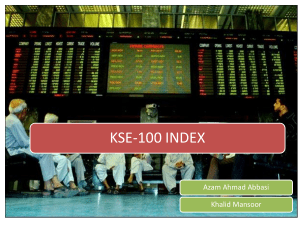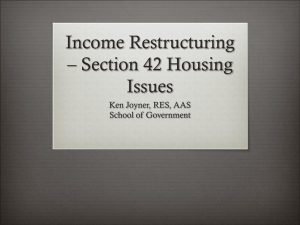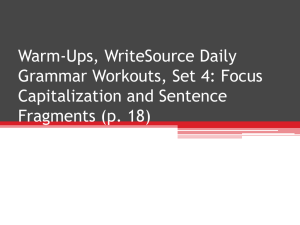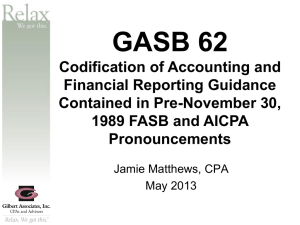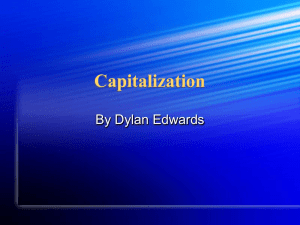What is SENSEX? - ICSI Knowledge Portal
advertisement
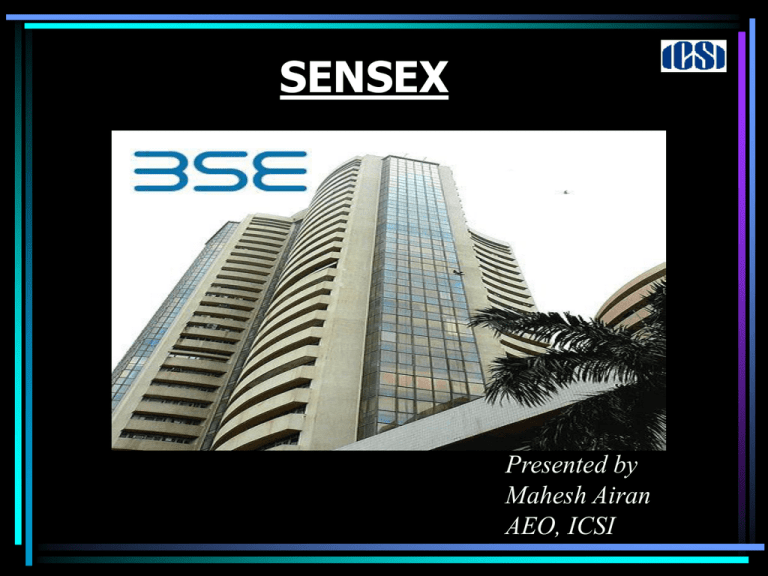
SENSEX Presented by Mahesh Airan AEO, ICSI What is SENSEX? The Sensex is the abbreviated form of BSE-sensitive index, is a “free float market capitalization weighted” index of 30 stocks representing a sample of large well established and financially sound companies. History of SENSEX Sensex, first compiled in 1986, is an index of BSE, situated in financial capital of India (Mumbai) was calculated on a “Market Capitalizationweighted” methodology of 30 component stocks. Since September 1, 2003, SENSEX is being calculated on freefloat market capitalization methodology. Objective of SENSEX The SENSEX is the benchmark index of Indian capital market with wide acceptance among individual investors, institutional investors, foreign investors and fund managers. Main objectives are:To measure market movements. Benchmark for fund performance. For index based derivative products. Key points of BSE Base year Base index value Date of launch Method of calculation 1978-79 100 01-01-1986 No of scrips 30 Index calculation frequency 15 seconds Launched on full market capitalization method shifted to free floated market capitalization. Objective Of SENSEX • To measure market movements Given its long history and its wide acceptance, no other index matches the SENSEX in reflecting market movements and sentiments. SENSEX is widely used to describe the mood in the Indian Stock markets. • Benchmark for funds performance The inclusion of blue chip companies and the wide and balanced industry representation in the SENSEX makes it the ideal benchmark for fund managers to compare the performance of their funds. • For index based derivative products Institutional investors, money managers and small investors all refer to the SENSEX for their specific purposes The SENSEX is in effect the proxy for the Indian stock markets. The country's first derivative product i.e. Index-Futures was launched on SENSEX. Free Float Index An index based on the market capitalization weighted method takes into account the total market capitalization of a company, regardless of the number of share actually available for trading (that is, the ability of free floating shares). The free float market capitalization method on the other hand takes into account only the shares that are readily available for trading. For example , company A’s market capitalization was Rs. 68,250 million as it had issued 195 million shares @ Rs.350. Of these, if only 75 million shares are available for trading, then the market capitalization of free floating stock of the company on that date would be Rs. 26,250 million(350×75 million shares). Free Float does not Include: • Shares held by directors/ founders/acquirers. • Shares held by persons/bodies with “Controlling Interest” • Shares held by Government as promoter • Holding through FDI route. • Locked in Shares • Equities held by employee welfare trust. Formula to calculate Sensex • Sensex = Free Float market Capitalization Index Divisor Index Divisor = previous day free float Market Capitalizaton previous day sensex value For Example:• Suppose the Previous day free float market capitalization is Rs. 3,00,000 crore and Previous day Sensex value is 20,000 points. Accordingly, Index divisor becomes 15 • Now, suppose Current day free float market capitalization increases to Rs. 3,30,000 hence, current day sensex is 22,000 points. Example 2 An index is calculated daily by tracking the share prices of it’s constituent member companies. SENSEX is calculated using market capitalization method. Every index is associated with base year. The base date for SENSEX is 1st April 1979 and base point is 100. The basic calculation of an index, on a particular date, involves the following steps: Calculate the market capitalization of each individual company comprising the index. For example if a company has 195 million shares outstanding and its closing price on that day at BSE was Rs.350 per share then its market capitalization on that date is 195*350= Rs.68,250 million. Calculation Of SENSEX Calculate the total market capitalization (TMC) by adding the individual market capitalization of all the companies in the index. Assume that the total market capitalization of all companies in the index adds up to Rs.26,175 billion on that date. Computing of the index now requires the index value and total market capitalization of the previous day. If on the previous day, the total market capitalization was Rs.25,310 billion and the index was 10635, the index for the next day is calculated as: Index value= Index on previous day × TMC for current day MC of previous day Thus, the index is 10,998 = (10,635×26,175/25,310) implying that the index rose by 363 points over the previous day. 30 Most Traded Companies Of BSE • ACC • AIRTEL • BHEL • DLF • GRASIM Contd. • HDFC • HDFC BANK • HINDALCO • ICICI • INFOSYS Contd. • ITC LIMITED • JAYPEE • L&T • M&M • MARUTI Contd. • NTPC • ONGC • RELIANCE INFRA • RANBEXY • RELIANCE COMM Contd. • RIL • SUN PHARMA • SBI • STERLITE • TATA MOTORS Contd. • WIPRO • HUL • TCS • TATA STEEL • TATA POWER Criteria for listing of scrips Quantitative criteria: Market capitalization Liquidity • Trading frequency • Number of trades • Value of share traded Industry representation Listed history Qualitative criteria: Track record Market Capitalization The scrip should figure in the top 100 companies listed by market capitalization. Also market capitalization of each scrip should be more than 0.5 % of the total market capitalization of the Index i.e. the minimum weight should be 0.5 %. Since the SENSEX is a market capitalization weighted index, this is one of the primary criteria for scrip selection. Liquidity • Trading Frequency: The scrip should have been traded on each and every trading day for the last one year. Exceptions can be made for extreme reasons like scrip suspension etc. • Number of Trades: The scrip should be among the top 150 companies listed by average number of trades per day for the last one year. • Value of Shares Traded: The scrip should be among the top 150 companies listed by average value of shares traded per day for the last one year. Industry Representation & Listed History Industry Representation: Scrip selection would take into account a balanced representation of the listed companies in the universe of BSE. The index companies should be leaders in their industry group. Listed History: The scrip should have a listing history of at least one year on BSE. 5 Day Technical Analysis Chart of Indian stock market BSE Sensex Index Monthly Technical Analysis Chart of Indian stock market BSE Sensex Index Who are Bulls & Bears Those who buy shares in anticipation of increase in prices are commonly referred to as bulls And those who sell shares anticipating a fall in prices are referred to as bears.
